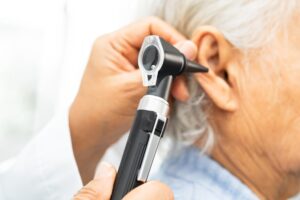What is mild hearing loss? How might it affect me every day? Can hearing aids help with mild hearing loss? Let’s explore!
Hearing loss in adults often starts gradually, almost undetectable, with people overlooking the early signs until it progresses. Even mild hearing loss can make it hard to hear soft sounds and follow conversations easily. You may even find yourself frequently asking others to repeat themselves or struggling in noisy environments.
Though it seems minor, untreated hearing loss can impact daily life and personal interactions over time. Communication difficulties can lead to social withdrawal, isolation, and even cognitive decline as your brain works harder to compensate.
This is where working with an audiologist and hearing aids can help, even in the early stages of hearing loss. Modern hearing aids can amplify the sounds you’re missing, improving speech comprehension. Working to address any form of hearing loss early can help you to maintain your quality of life, relationships, and cognitive abilities as you age. Let’s look at how hearing aids can make a difference.
What is Mild Hearing Loss?
Mild hearing loss is characterized as difficulty hearing or discerning soft or distant sounds that typically fall between 26 and 40 decibels (dB). This might be first noticed as a difficulty hearing birds chirping or small children in your day-to-day life.
Other signs a person is experiencing mild hearing loss might include:
- Asking others to repeat themselves
- Difficulty following conversations, especially in social settings like restaurants
- Turning up the volume on TVs and radios
- Feeling fatigued or drained after social interactions due to the strain of listening
Even something seemingly harmless, such as not hearing alarm clocks or cell phones, could be a sign of mild hearing loss and should be checked out.
How Can Mild Hearing Loss Affect Your Daily Life?
While we might think that the effects of mild hearing loss appear minor, even minor hearing loss can have major impacts on a person’s daily life, affecting everything from social interactions to cognitive function.
Social Impact
Being social, we’ve all grown to need regular communication in order to be happy and healthy. When conversation becomes challenging for a person, it can lead to isolation and frustration, often straining relationships. This can be a very jarring experience and can lead to them avoiding social interactions, which can lead to loneliness and depression.
Cognitive Impact
One of the more serious impacts hearing loss, even mild hearing loss, can have on a person is how it contributes to cognitive decline. Numerous studies have shown a clear link between hearing loss and conditions like dementia. When the brain struggles to hear or understand sounds, it can take away resources from other cognitive tasks, which, over time, can lead to a loss of mental sharpness and focus.
Other Roles Hearing Aids Can Play
While hearing aids have had many iterations over the centuries, modern hearing aids are discreet, comfortable, tiny electronic devices that capture and amplify the sounds around them. Today’s devices come with a host of functions and features like directional microphones and Bluetooth, making them incredibly functional in everyday life outside of their primary role in amplification.
Benefits of Hearing Aids for Mild Hearing Loss
As technology has improved, so too has the impact these devices have had on those with mild hearing loss. Probably the most important benefit of considering hearing aids is the prevention of further hearing loss by treating these issues early. According to experts, addressing mild loss with hearing aids can prevent it from worsening and improve overall hearing health and cognitive function.
Improved filters and better speakers help to improve communication and understanding during conversations, reducing the need to ask others to repeat themselves. Hearing aids also help to enhance a person’s quality of life by making social interactions less tiring and more enjoyable. Hearing aids can also help to improve a person’s spatial awareness by amplifying crucial sounds important for tasks like driving or crossing the street.
Common Concerns About Hearing Aids
While the benefits of hearing aids are numerous, some have concerns regarding cost, appearance, and comfort. While only you can determine the investment you are willing to make in yourself, hearing aids have grown to become incredible devices that are comfortable, discreet, and highly functional. Some adjustments may be necessary to become fully comfortable, but working with an experienced audiologist can help.
Do You Need a Hearing Aid for Mild Hearing Loss?
If you’re considering ways you can effectively address your mild hearing loss, here are some factors we think you should consider:
Severity of Impact
How much does your hearing loss affect you socially? What are the potential impacts on your mental health and overall quality of life if you aren’t able to interact with those around you? Do you struggle in conversations or feel isolated in social situations or conversations?
Personal Preference
For most, preserving a certain quality of life will make scheduling annual hearing exams a priority. Others, however, will choose to let these issues go untreated until the condition becomes worse. What is your personal preference, and how would you imagine hearing loss could impact your daily life if it got worse?
–
Mild hearing loss might seem inconsequential when first noticed, but it can have profound impacts, affecting everything from how you interact with those around you to your risk of developing dementia in the future.
Do you need a hearing aid for mild hearing loss? Maybe, but with expert testing and analysis, we make sure every patient has access to the most appropriate treatment for their hearing issues, which may include hearing aids. Don’t wait until your hearing gets worse. Make your appointment today.




